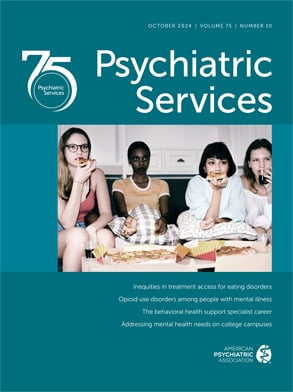Appropriate Use of Police Officers?
To the Editor: A column in the November issue (
1 ) and a research report in the February issue (
2 ) describe crisis intervention training (CIT) for police officers in Ohio. These reports are important because they offer a possible solution to the dilemma of sending police officers to interact with mental health patients in critical situations. As a psychiatric nurse and the wife of a police lieutenant, I appreciate the authors' attempt to address this problem. Their emphasis on encouraging partnerships between law enforcement and mental health providers is a progressive approach.
The Ohio CIT program trains officers to recognize persons who are experiencing acute symptoms of mental illness and provides them with deescalation tools. Officers are also informed about available community resources. The authors describe an alternative paradigm that would benefit the health care and law enforcement communities and, more importantly, place responsibility for the care of these patients in more appropriate hands. A crisis intervention model could be developed in which dispatchers are trained to identify mental disturbance calls and dispatch emergency medical technicians and paramedics.
A primary concern, however, involves training police officers to handle mental health crises. Police officers are not health care providers. A 40-hour course will provide much-needed information but should not be viewed as a solution to the emergency needs of mental health clients. The study in the February issue demonstrated an increase in the number of dispatch calls "related to mental disturbances" after the training. Heightened awareness of mental health issues among dispatchers as a result of the CIT training is the likely explanation. However, the dispatchers were given no additional training about how to triage these individuals appropriately. Dispatchers need to be trained to evaluate the situation by asking the correct questions and reporting the right information to the most appropriate emergency medical technicians and paramedics.
Law enforcement officers are being assigned greater responsibility in our communities. In addition to providing for the safety of citizens and property, many are required to participate in activities such as Drug Abuse Resistance Education, community policing, Neighborhood Watch, bioterrorism preparation, and public education. Is it the best use of training dollars to prepare law enforcement officers to become experts in dealing with health care conditions?
Paramedics have the background to deal with acutely ill patients. The Emergency Medical Technician Paramedic: National Standard Curriculum (
3 ), a course for paramedics offered by the National Highway Transportation Safety Administration, covers topics such as communication, clinical decision making, and management of the combative mental health client, which provide a foundation for handling mental disturbance calls. Educational standards for police officers differ between states. However, a review of training options for police officers, including degree programs at Missouri Southern State University and training offered by California Peace Officer Standards and Training (
4 ) and the New York Police Department (
5 ), reveals that most offer little or no education about persons with mental illness. Dispatching police officers to determine whether patients require emergency treatment, placement, or arrest further criminalizes and demoralizes persons with mental illness. Emergency medical service personnel are the appropriate resource for crisis intervention for the mental health client.

